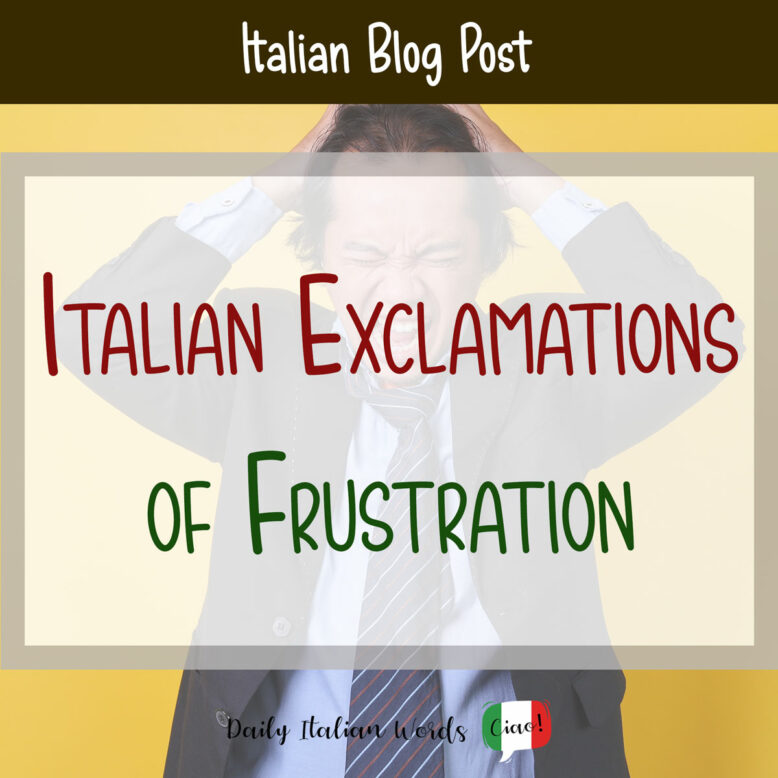In Italy, there are plenty of things that can make us see red, whether it’s being stuck in an interminable queue at the post office, no matter what time of day it is, or having to resubmit our permit application for home renovations simply because we used the wrong stamp (even though the same official instructed us to use it). And when it comes to expressing frustration, we don’t hold back.
Thankfully, we have a wide range of Italian exclamations of frustration at our disposal. Of course, The tone and intensity with which we say them – and the accompanying hand gesture! – may change depending on the context.

Mamma mia!
English equivalent: Oh boy!
If you’ve ever been to Italy or know someone from the country, you’ve probably heard this expression more times than you can count. But don’t dismiss it as just another cliché because Mamma mia! is seriously part of our daily conversation.
Literally translated to “my mother”, Mamma mia! is used it to express a whole range of emotions – surprise, joy, fear, annoyance, disappointment, anger – you name it! But when it comes to frustration, Mamma mia! is the ultimate phrase for those moments when you’re feeling exasperated, annoyed, or overwhelmed.
Mamma mia, questa coda è interminabile!
Oh boy, this queue is endless!

Uffa!
English equivalent: Oh, for heaven’s sake! / Ugh!
Uffa! is another very popular Italian exclamation of frustration. It’s that word that’s always ready to come to our rescue when frustration hits. It can convey different levels of irritation depending on our tone and the situation.
The best part? Uffa! has a lighthearted and humorous vibe that Italians of all ages love. It’s the perfect way to add some fun and flair to everyday conversations, whether you’re waiting for your pizza to arrive or trying to wrap your head around Italian grammar rules. Just let out a big Uffa! and let all that tension fly out the window. Trust me, you’ll feel better in no time!
Uffa, la lavatrice non funziona!
Oh, for heaven’s sake! The washing machine isn’t working!

Madonna!
English equivalent: Good Lord!
We are known for being passionate, and when it comes to expressing frustration or annoyance, we don’t hold back! One of the most iconic and colorful expressions you’ll hear in Italy is Madonna! Catholicism has a strong influence in Italian culture, and using religious references in everyday language is pretty common. So, what better way to vent your frustration than by invoking the name of the holy mother herself?
But think of it as a religious invocation. Madonna! is rather a sassy exclamation that conveys anything from mild irritation to outright rage. Think of it as the Italian version of “Oh my God!” but with a bit more flair and drama.
Madonna, ma quanta gente c’è oggi in banca?
Good Lord! How many people are there at the bank today?
Note: although it is very used colloquially, if you are with someone that is very religious, he or she might not appreciate the use of this word.

Santo cielo!
English equivalent: Good heavens!
Here’s another Italian exclamation of frustration that’s a great example of how we like to use religious references in everyday language. When we say Santo Cielo!, we do so with a dramatic flair, often accompanied by exaggerated hand gestures and facial expressions that emphasise our frustration.
The expression is often used when something unexpected or undesirable happens, and we feel disappointed. It can also be used when someone is at a loss for words or is overwhelmed by a situation.
Santo cielo, che disastro che ho combinato!
Good heavens, what a mess I’ve made!

Dai!
English equivalent: Come on!
Dai! in Italian is commonly used to express frustration, disappointment, and impatience – even encouragement, but that’s in more positive contexts. It’s another tiny word that’s become an integral part of the national lexicon.
There’s no problem that can’t be solved with a good dose of dai! , from the super slow colleague who’s taking ages to complete a task to a referee who misses a crucial foul during a match of our favorite football team, a well-placed dai! can do wonders to lift our spirits.
Dai, lasciami in pace!
Come on, give me a break!

Che palle!
English equivalent: What a pain!
Ah, balls – a topic that transcends language barriers! Like many other languages, Italian, too, has a fondness for invoking balls when expressing frustration in a variety of situations. So, if you ever hear someone shouting Che palle! around you, don’t panic – it’s just our cheeky way of expressing annoyance.
Literally translated to “What balls”, Che palle! is an exclamation of frustration that’s considered a mild swear word in Italian. We often use it when things don’t go as planned, when someone is being difficult, or simply when we’re bored out of our minds.
Che palle, è già ora di andare!
Bummer, it’s time to go already!

Porca miseria!
English equivalent: Dammit! / For god’s sake!
Porca miseria literally means “pig poverty”. I know it may seem a bit odd at first glance, but as it turns out, pigs are another common source of interesting Italian expressions. This phrase is another mild swear word we use to express frustration with an unpleasant situation. It can become much more vulgar with a few twists – but we won’t go into that here.
When delivered with the right tone and inflection, porca miseria can pack a powerful punch and convey a deep sense of disappointment. No wonder this colorful expression has become a beloved staple of the Italian language and culture.
Porca miseria, era nuova!
(said after spilling sauce on your brand new shirt)
Dammit, it was new!

Che cavolo!
English equivalent: What the heck!
The Italian expression che cavolo! is a fiery and flavourful way to vent one’s frustration. The use of the word cavolo, which literally means “cabbage,” adds a zesty twist to the phrase, while still maintaining a level of decorum and respectability (there’s a more vulgar expression that sounds similar, but I leave you to guess).
Resorting to the cabbage is our attempt to remain polite even in moments of full exasperation. And it’s still a very effective and incisive expression to make a point.
Che cavolo, guarda dove metti i piedi!
What the heck, watch your step!

Accidenti!
English equivalent: Dammit!
Accidenti! is another common Italian exclamation of frustration that perfectly captures the state of intense annoyance of the speaker. With roots in the verb accidere, which means “to occur,” accidenti is a great alternative to porca miseria when you want to sound super elegant and polite.
But that’s not all – accidenti can also be used mid-sentence to add emphasis, and it means “a damn thing”. For example, when you’re struggling to understand something, just toss in a Non capisco un accidente (I don’t understand a damn thing)!
Accidenti, si è bruciato il sugo!
Dammit, I burned the pasta sauce!

Mannaggia!
English equivalent: Dang it!
Mannaggia! is a mild Italian interjection similar to saying “darn!” or “drat!” in English. It’s the perfect exclamation for those moments when you need to let off some steam but want to sound polite – in other words, it’s the type of exclamation to use in front of your mom.
It is believed the phrase started off in southern Italy as male ne abbia, which translates roughly as ‘bad things to (someone/something)’. We also use it specifying to whom or what we’re wishing bad things, like in Mannaggia a te! (Damn you!) or in combination with another word, such as Mannaggia la miseria! (literally Damn the misery!).
Mannaggia, è finito il latte!
Damn, I’m out of milk!

Porco zio!
English equivalent: Damn!
If you translate this phrase literally, it means “pig uncle.” Pretty strange, right? But in Italian, it’s an exclamation used to express frustration and annoyance. Imagine you’re having one of those days where nothing goes right – you missed your bus, spilled coffee on your shirt, and then dropped your phone. Porco zio! would be the perfect thing to shout in that moment – just avoid doing so in front of your boss!
The word zio (uncle) stands in for Dio (God) – a creative euphemism to vent your frustration without crossing the line into blasphemy. Italians often modify potentially offensive expressions to make them more socially acceptable! An expression that works in a similar way is Zio cane! (lit “uncle dog”), which keeps things colorful and intense without offending religious sensibilities.
Non trovo le chiavi di casa, porco zio!
I can’t find the house keys, damn it!

Vabbè!
English equivalent: whatever!
This exclamation of frustration is a contraction of va bene (it’s fine) and is commonly used in Italian to express resignation, conveying a sense of reluctantly accepting a situation – as if to say, “I am not completely satisfied, but okay, it will do”. Additionally, it can be used to change the subject, encapsulates the feeling of giving up on a discussion or topic that’s not worth pursuing further.
Notice the emphasized “B” sound that gives the expression its distinctive character! Try saying it with a bit of energy: “Vabbè!”
Vabbè, lasciamo perdere!
Whatever, let’s forget about it!

Piantala!
English equivalent: Cut it out!
Piantala! is an expressive Italian phrase that’s perfect when we want someone to quit their bothersome behaviour. You’ll often hear Italian mums shouting it when their kids fanno i capricci (are throwing tantrums). This exclamation is derived from the pronominal verb piantarla, which means to cease or desist – not to be confused with piantare, which means “to plant” (as in planting trees). Mixing them up could lead to amusing misunderstandings!
Similar expressions with the same meaning include Falla finita! and Smettila!, both of which can be used interchangeably with Piantala!
Piantala di dire cavolate, non ti ascolta nessuno!
Stop talking silly things, no one is listening to you!

Basta!
English equivalent: Stop it!
Basta is the imperative form of the verb bastare (“to suffice”, “to be enough”) and is used when patience is a distant memory. It’s like saying, “This situation needs to stop right now because I’ve had enough!” A typical scenario? Screaming kids. The intonation here is crucial. You don’t just say it; you proclaim it. Loudly, almost like you’re shouting.
And when “basta” needs a little extra punch, you can pair it with an adverb, for instance Adesso basta! (Enough now!) or Basta così! (This is enough!)
Bambini, basta con questi capricci!
Children, enough with these tantrums!

Sono stufo/a!
English equivalent: I’m sick and tired of…!
This is a strong expression, yet still within the polite realm, that conveys frustration or irritation with something or someone. Interestingly, the adjective stufo comes from the word stufa, meaning “stove” in English. When you think of it, this analogy makes perfect sense – just as smoke billows out of a stove, annoyance seems to pour out of your head when you’re fed up with something!
There are some interesting variants to emphasise just how thoroughly fed up you are. For instance, sono arcistufo/a (seriously fed up) and sono stufo/a marcio/a, which literally translates to “rotten fed up”- quite vivid, isn’t it?
Sono stufa di Paolo e delle sue battutine!
I’m sick and tired of Paolo and his jokes!

Fai come ti pare!
English equivalent: Whatever!
Though it literally translates to “do as you like” and may sound somewhat gentle, this phrase is used as a very common exclamation of frustration in Italy. Particularly in situations where you’re so exasperated by a persistent discussion that you metaphorically raise the white flag and show complete disinterest or resignation. It’s like giving up on convincing the other person and letting them make their own choice, regardless of the consequences.
For a more forceful and intense expression, you can say Fai come cazzo ti pare (Do whatever the hell you want), but keep it for your close circle of friends or very informal settings.
Pensi davvero che non debba tornare con Paolo? – Senti, io ti ho detto mille volte come la penso, poi fa come ti pare!
Do you really think I shouldn’t get back together with Paolo? – Look, I told you what I think a thousand times, now do whatever you want!

Valentina Nicastro is a travel writer in love with her home country, Italy. Having travelled widely around the globe, she realised there was more to explore closer to home and decided to put the passport aside for a while. When she is not immersed in documenting Italy, you’ll find her donning her communication consultant hat, weaving words as a content writer and bridging linguistic divides as a translator.


